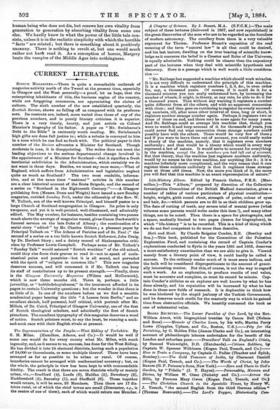CURRENT LITERATURE.
SCOTCH MeaezniEs.—There is quite a remarkable outbreak of magazine activity north of the Tweed at the present time, especially in Glasgow and the West generally—a proof, let us hope, that the
enterprising inhabitants of this, the business region of the country, while not forgetting commerce, are appreciating the claims of culture. The sixth number of the now established quarterly, the Scottish Review, shows no falling off as compared with its predeces- sors. Its contents are, indeed, more varied than those of any of the previous numbers, and in purely literary criticism it is superior.
There is a very timely, hearty, and just article on Colonel Maurice's biography of his father. A paper on Mr. Swinburne's Debt to the Bible" is eminently worth reading. Mr. Swinburne's high gifts are done full justice to ; while a rebuke is conveyed to him in a tone which he can find no fault with. The political paper in this
number of the Review advocates a Minister for Scotland. Though moderate in tone, it is disappointing. The writer does not meet the leading objections to the serious departmental change involved in the appointmen:-, of a Minister for Scotland—that it signifies a fresh territorial subdivision in the Administration, which certainly we do not want in these days. Besides, we must say once more,—What of England, which suffers from Administrative and legislative neglect quite as much as Scotland ? The two most readable, informa- tive, and at the same time " national " articles in this number are a clear historical account of the Scots Brigade, and the second of a series on "Scotland in the Eighteenth Century."—A Glasgow publishing firm (Messrs. Dunn and Wright) have issued a new Sunday magazine, entitled Sunday Talk, under the editorship of the Rev. W. W. Tallooh, son of the well-known Principal, and himself pastor to a large Church of Scotland congregation in Glasgow. Its price is only twopence, and yet it is well-printed, well-illustrated, and admirably edited. The May number, for instance, besides containing two poems much above the average of magazine verses, gives Canon Duckworth's funeral sermon on the late Duke of Albany ; the continuation of a serial story " edited " by Mr. Charles Gibbon ; a pleasant paper by Principal Tulle& on "The Athens of Pericles and of St. Paul i" the second of a series on a too little known Scotch Reformer, John Craig, by Dr. Herbert Story ; and a dainty morsel of Shakespearian criti- cism by Professor Lewis Campbell. Perhaps some of Mr. Talloch's "Sunday Talk" would astound "Scotch worthies" of the old school, could they rise from their graves to read it—not to speak of eccle- siastical pains and penalties—but it is all sound, and pervaded with the spirit of "religion in common life." This new magazine deserves success, and will command it if Mr. Talloch can keep its staff of contributors up to its present strength.—Finally, there is the Glasgow University Magazine (Wilson and McCormick), which is now three months old. There is, perhaps, a little juvenility, or " hobbledehoyishness," in the treatment afforded in its pages to certain University questions ; but the wonder is that there is so little of it. In one of the numbers before us we find a sensible academical paper bearing the title "A Lesson from Berlin," and an excellent sketch, half personal, half critical, with portrait after Mr. Millais, of Dr. Caird, Principal of Glasgow University, one of the first of Scotch theological scholars, and admittedly the first of Scotch pieachers. The excellent typography of this magazine deserves a word of notice. Scotch printers must, to say the least, be running a neck- and-neck race with their English rivals at present.


































 Previous page
Previous page